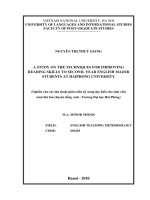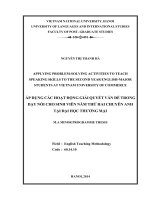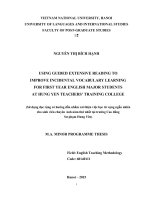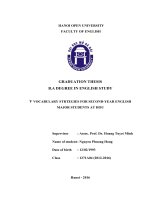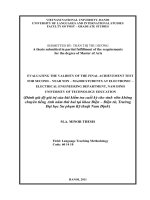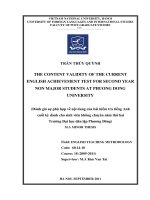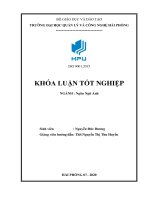V VOCABULARY STRTEGIES FOR SECOND YEAR ENGLISH MAJOR STUDENTS AT HOU
Bạn đang xem bản rút gọn của tài liệu. Xem và tải ngay bản đầy đủ của tài liệu tại đây (268.01 KB, 48 trang )
HANOI OPEN UNIVERSITY
FACULTY OF ENGLISH
GRADUATION THESIS
B.A DEGREE IN ENGLISH STUDY
V VOCABULARY STRTEGIES FOR SECOND-YEAR ENGLISH
MAJOR STUDENTS AT HOU
Supervisor
: Assoc. Prof. Dr. Hoang Tuyet Minh
Name of student : Nguyen Phuong Hong
Date of birth
: 12/02/1993
Class
: 1271A04 (2012-2016)
Hanoi - 2016
Graduation Paper
DECLARATION
TITLE: VOCABULARY STRTEGIES FOR SECOND-YEAR ENGLISH
MAJOR STUDENTS AT HOU
(Graduation Paper submitted in Partial Fulfillment for B.A Degree in English)
I certify that no part of the above report has been copied and reproduced me
from any other person’s work without acknowledgement and that the report is
originally written by me under strict and enthusiastic guidance of my
supervisor.
Hanoi, 15th April 2016
Student
Supervisor
Nguyen Phuong Hong
Hoang Tuyet Minh
ACKNOWLEDGEMENT
Nguyen Phuong Hong-1271A04-(2012- 2016)
Graduation Paper
I wish to convey my sincere appreciation to many people who wholeheartedly
helped me to accomplish this paper. Without their guidance and advice, this
paper might not have been completed.
Firstly, I would like to express my deepest gratitude to my supervisor Assoc.
Prof. Dr. Hoang Tuyet Minh for her enthusiatic guidance, thoughtful and
constructive comments on almost every aspect on this study. Without invaluable
supervision and words of encouragement, my study would not have been
completed.
Secondly, I would like to express my special thanks to all the teachers at
English Faculty of HOU for their precious lectures and instructions which have
helped me much in completing the final task.
Thirdly, I also wish to send my thanks to HOU 2 nd year English major students
for their animated cooperation in completing my survey questionnaires.
Finally, I would like to give my great thanks to my beloved friends and family
members who supported me throughout my research paper.
Hopefully, this paper will be useful for learners of English in generals and the
2nd year English major students at Hanoi Open University.
Hanoi, 15th April, 2016
Student
Nguyen Phuong Hong
LIST OF ABBREVIATIONS
Nguyen Phuong Hong-1271A04-(2012- 2016)
Graduation Paper
COG
DET
FOE
HOU
L1
L2
LLSs
LTM
STM
Cognitive Strategies
Determination Strategies
Faculty of English
Hanoi Open University
the first language/ mother tongue
the Second Language/ Foreign Language
Language Learning Strategies
Long-term memory
Memory Strategies
Nguyen Phuong Hong-1271A04-(2012- 2016)
Graduation Paper
TABLE OF CONTENT
CHAPTER 1: INTRODUCTION........................................................................1
1. Rationale........................................................................................................1
2. Aims and Objectives of the study..................................................................2
3. Scope of the study..........................................................................................2
4. Research questions.........................................................................................2
5. Methods of the study.....................................................................................3
6. Design of the study........................................................................................3
CHAPTER 2: LITERATURE REVIEW..............................................................4
2.1. Previous Studies..........................................................................................4
2.2. Theoretical Background..............................................................................5
2.2.1. Knowing a Word..................................................................................5
2.2.2. Vocabulary Learning............................................................................7
2.3 Theoretical framework.................................................................................8
2.3.1. Definitions of vocabulary learning strategies.......................................8
2.3.2. Classifications of vocabulary learning strategies...............................10
2.3.3. Importance of Vocabulary Learning Strategies..................................18
2.3.4. Memory-based Strategic Framework for Vocabulary Learning
Strategies......................................................................................................19
2.4. Summary of the Chapter...........................................................................22
CHAPTER 3: THE STUDY...............................................................................22
Nguyen Phuong Hong-1271A04-(2012- 2016)
Graduation Paper
3.1. Methodology.............................................................................................23
3.1.1. Survey.................................................................................................23
3.1.1.1. Questionnaire................................................................................23
3.1.1.2. The subjects..................................................................................23
3.1.2. Procedure............................................................................................23
3.2. Results.......................................................................................................24
3.3. Conclusion................................................................................................27
CHAPTER 4: FINDINGS AND DISCUSSION................................................27
4.1. Data Analysis............................................................................................27
4.2. Some suggestions in learning vocabulary.................................................27
4.3. Summary of the chapter............................................................................34
CHAPTER 5: CONCLUSION...........................................................................35
5.1. Summary of the thesis..............................................................................35
5.2. Suggestions for further research...............................................................35
REFERENCES...................................................................................................35
APPENDIX.........................................................................................................38
Nguyen Phuong Hong-1271A04-(2012- 2016)
Graduation Paper
LIST OF FIGURES AND TABLES
Nguyen Phuong Hong-1271A04-(2012- 2016)
Graduation Paper
CHAPTER 1: INTRODUCTION
1. Rationale
A language is a systematic means of communication that we all use to
express ourselves and communicate to others. A language is the written and
spoken methods of combining words to create meaning used by a particular
group of people. Over the years, English has become the international
language. "English is the language most frequently used in international trade,
diplomacy and tourism and that it is studied by more people than any other
language" (Smith 1983). Crystal (1992) reported that non-native speakers of
English comprise more than two thirds of its potential speakers. This seems to
be an appropriate edge to argue that English, in international settings, plays an
increasingly important role. Since English is regarded as the universal
language, lexical competence is seen as the heart of language learning and the
ultimate goal to improve the language competence of learners. Additionally,
vocabulary has been recognized as an important factor for language learning
because inadequate vocabulary knowledge leads the learners encounter
difficulties in language learning.
Learners can significantly improve their language competence by
developing their ability to use vocabulary learning strategies (VLSs). What is
more? Mastering vocabulary is one of the most challenging tasks that any
learner faces while acquiring another language (Nyikos and Fan, 2007). Thus,
language learning students need to be trained with the strategies which can
help the learners attaining the meaning of words. The particular strategies
which are used by learners for the acquisition of new words in the second
language are called ‘vocabulary learning strategies’ (Gu, 1994). To deal with
vocabulary learning problems, vocabulary learning strategies should have
Nguyen Phuong Hong-1271A04- (2012- 2016)
1
Graduation Paper
been brought to the language classroom to boost the learners’ effectiveness in
language learning. Rakchanok (2014) also showed that “Under the constraint
of language learning, the results show two main purposes in employing
strategies for dealing with vocabulary learningproblems: 1) to discover the
meaning of unknown words; and 2) to retain the newly learned words in longterm memory and recall them at will.”
In Faculty of English of Hanoi Open University, although strategies for
learning vocabulary is not considered as a major subject, a few researches on
vocabulary learning strategies have been completed by the students of the
University. Wherein, the recent study indicates that due to studies for the own
students of HOU, the researchers concluded that it should have some specific
strategies in learning vocabulary, as well as a number of approaches may be
applied for short and long term memory. However, there are still certain
restrictions of these studies such as limitation of setting out a map for
strategies and specific ways to apply them. Therefore, in this study, the
researcher will seek to complement and dig deeper to this interesting topic.
2. Aims and Objectives of the study
This study aims at crutinizing the obstacles of the second year English
students at HOU when they learn English by using vocabulary learning
strategies.
3. Scope of the study
4. Research questions
Nguyen Phuong Hong-1271A04- (2012- 2016)
2
Graduation Paper
5. Methods of the study
The study is conducted by several methods as qualitative, quantitative,
descriptive and analysis. Qualitative is used to collect related information
from previous researches. Quantitative is used to collect data from
questionnaires and students’ answers. Descriptive is used to describe
theoretical background and the figure from questionnaire result. Analysis is
used to analyses data from the result of survey and investigating problems
form the gathered data. The major source of data for the study was students’
survey questionnaire resppondents while direct observation applied with an
aim to get more supplement information for any confirmation of the findings.
6. Design of the study
The thesis is divided into five chapters
Chapter 1 introduces the background to the study and the growing concern
about the vocabulary learning strategies.
Chapter 2 covers information about vocabulary learning strategies and all the
researches on it in the world
Chapter 3 is about the methodologies of the survey
Chapter 4 presents the results and discussion of the survey’s result
Chapter 5 is about the recommendation and suggestions for further studies.
REFERENCES
APPENDIX
Nguyen Phuong Hong-1271A04- (2012- 2016)
3
Graduation Paper
CHAPTER 2: LITERATURE REVIEW
2.1. Previous Studies
Through out the years, voluminous studies have done on the subject of
vocabulary acquisiton strategies for learners in expanding their amount of
vocabulary. Concerning direct and indirect strategies, Oxford (1990) brought
out a completed classification of effective learning strategies for vocabulary
learners. From the strategies, which used by the learners alone to strategies,
which required to interact with learners’ peers to achieve the highest
efficiency in learning vocabulary. Seven years later, a large-scale study
conducted by Schmitt (1997) represented sample of 600 students. The
Schmitt’s research is very interesting. First, the comparison of the two set of
data (the most used strategies versus the most useful strategies) revealed some
overlap. There were six strategies in common. Then, patterns of strategy use
change over time as a learner either matures or becomes more proficient in
the target language. Finally, the results indicate that learners willing to try
new strategies if they are introduced and instructed. Since then, Schmitt’s
reasearch was great importance for his proposal of a comprehensive
taxonomy of vocabulary learning strategies. In 1996, Gu and Johnson
administered a questionnaire to 850 second year Chinese University students
to figure out how they use different strategies and how this affects their
learning outcome in terms of vocabulary size and general English proficiency.
The main findings were that: (1) the two metacognitive strategies, selfinitiation and selective attention, tend to be positive and the best predictor of
English proficiency; (2) contextual guessing, skilful use of dictionaries,
contextual encoding, and activation strategies are correlated with both English
proficiency and vocabulary size.
Nguyen Phuong Hong-1271A04- (2012- 2016)
4
Graduation Paper
Vocabulary Learning Strategy is an interesting topic, which attracted
many researchers study on this topic. These well-known researches
contributed significantly to the field of VLSs and for students who study
English as their second language. What is more? Three research papers are
shared the same ideas. As a result, it supplements the others.
2.2. Theoretical Background
2.2.1. Knowing a Word
Without a huge amount of words, English learners cannot not only
entirely comprehend the meaning of listening and reading, but also
communicate or express the meaning undoubtedly in the process of speaking
and. However, knowing a word is complicated and there are various
definitions for knowing a word. Nation (2001) applies the terms ‘receptive’
and ‘productive’ to vocabulary knowledge description covering all the aspects
of what is involved in knowing a word as in the following table.
Form
Spoken
Written
Receptive
What does the word sound like?
Productive
How is the word pronounced?
Receptive
What does the word look like?
Productive
How is the word written and
spelled?
Word parts
Receptive
What parts are recognizable in this
word?
Productive
What word parts are needed to
express this meaning?
Meaning
Form
meaning
& Receptive
What meaning does this word form
signal?
Nguyen Phuong Hong-1271A04- (2012- 2016)
5
Graduation Paper
Productive
What word form can be used to
express this meaning?
Concept &
referents
Receptive
What is included in the concept?
Productive
What items can the concept refer
to?
Associations Receptive
What other words does this make
us think of?
Productive
What other words can we use
instead of this one?
Use
Grammatical Receptive
In what patterns does this word
occur?
functions
Productive
In what patterns must we use this
word?
Collocations
Receptive
What words or types of words
occur with this one?
Productive
What words or types of words must
we use with this one?
Constraints
Receptive
on use
(register,
Where, when and how often would
we expect to meet this word?
Productive
Where, when and how often can we
use this word?
frequency…
Table 1: What Is Involved in Knowing a Word (Nation, 2001: 27)
However, Mondria and Wiersma (2004) state that productive and
receptive knowledge of a word tend to overlap since certain productive
learning leads to certain amount of productive knowledge. They also point out
Nguyen Phuong Hong-1271A04- (2012- 2016)
6
Graduation Paper
that productive learning is more difficult than receptive learning and it takes
more time. Moreover, productive knowledge decays faster than receptive
knowledge of a word.
According to Richards (1976), knowing a lexical item includes
knowledge of word frequency, collocation, register, case relations, underlying
forms, word association, and semantic structure. Ling (2005) states that words
are interwoven in a complex system in which knowledge of various levels of
a lexical item is required in order to achieve adequate understanding in
listening and reading or produce ideas successfully in speaking and writing.
In this section, we have been acquainted with the concepts of knowing
a word through the concepts of receptive and productive of the Nation. The
conceptual knowledge of word frequency, collocation, register, case relations,
underlying forms, word association, and semantic structure of Richards or the
level of word understanding based on the ability to apply it in four skill such
as reading, writing, listening and speaking. From here, the concept of a lexical
item is putted in for further studies of the strategies’ definitions.
2.2.2. Vocabulary Learning
Learning vocabulary is an arduous task. The task of vocabulary
learning is to see the distinction between knowing a word and using it.
Learning vocabulary should focus on remembering words and using them
easily in the right contexts. Evidence suggests that the knowledge aspect
requires employment of conscious mechanisms of learning while the skill
aspect involves implicit learning (Ellis, 1994). This is essential in selecting
strategies for both using words as well as knowing them.
Nguyen Phuong Hong-1271A04- (2012- 2016)
7
Graduation Paper
Nation (1990:33-50) remarks three factors which have influence on
making a word difficult to learn. The first is the learners’ previous
experiences of English and their mother tongue since one’s first language
affects the second language vocabulary acquisition and usually borrowing and
interference between first and second language vocabulary occurs. The
second factor is the way a word is learned or taught. The third aspect is the
intrinsic difficulty of the word which basically means that some words are
harder than others.
Laufer (1997:154) also mentioned the several factors which can make
learning a word difficult. For example, phonological factors, length, semantic
features, abstractness and multiple meaning may have an impact on how
easily the word can be learned.
In terms of learning vocabulary definitions, while (Ellis, 1994) refers to
the concept of “Conscious mechanisms of learning”, the Nation (1990) and
Laufer (1997) point out the factors that make us realize that learning English
vocabulary is not an easy task. From these points, a question is brought out to
see whether there are strategies that can help learners to accumulate
vocabulary more efficient and easier?
2.3 Theoretical framework
2.3.1. Definitions of vocabulary learning strategies
Throughout numerous studies, the definitions of “Languague learning
strategies (LLSs)” were dissected by the scholars all around the world to
contribute to a comprehensive definition of LLS.
O’Malley and Chamot (1990, p. 1) define language learning strategies
as “the special thoughts or behaviours that individuals use to help them
Nguyen Phuong Hong-1271A04- (2012- 2016)
8
Graduation Paper
comprehend, learn, or retain new information.” Oxford (1990, p. 8) states that
language learning strategies are “specific actions taken by the learner to make
learning easier, faster, more enjoyable, more self-directed, and more
transferable to new situations.” Nunan (1991, p. 168) sees language learning
strategies as “the mental processes which learners employed to learn and use
the target language.”
Though VLLs is a branch of LLSs, there are few definitions are given
for VLSs. The working definition of vocabulary learning strategies in this
research is adapted from Rubin. Rubin (1987, p. 29) defines lexical strategies
as “the process by which information is obtained, stored, retrieved, and used”
and “therefore vocabulary learning strategies could be any which affect this
broadly-defined process”. Follow this statement closely, Ellis (1999) defines
VLSs are “Specific strategies for learning vocabulary”.
But it seems that these definitions are still vague for the students and
researchers in the field of VLSs. So that, Nation (2001) sorted out that there
are 3 categories of strategies: planning, sources, and processes, each covering
a subset of strategies. ‘Planning’ involves choosing what and when to focus
attention on the vocabulary items. This category contains strategies for
choosing words, choosing the aspects of word knowledge, choosing
strategies, and planning repetition. ‘Sources’ refers to finding information
about words from analyzing the words; context, dictionary. ‘Process’ means
establishing lexical knowledge through powerful processes as noticing,
retrieving and generating. Two years later, Further, Catalán (2003, p. 56) sees
VLSs as “knowledge about the mechanisms (process, strategies) used in order
to learn vocabulary as well as steps or actions taken by students (a) to find out
the meaning of unknown words, (b) to retain them in long-term memory, (c)
Nguyen Phuong Hong-1271A04- (2012- 2016)
9
Graduation Paper
to recall them at will, and (d) to use them in oral or written mode.”
Eventually, in the year of 2011, Asgari and Mustapha gave a definition is
considered to be compendious, concise and newest definition of VLSs. Asgari
and Mustapha (2011, p.85) defined VLSs as ‘steps taken by the language
learners to acquire new English words.”
Therefore, it can be said that VLSs are commonly used not only to
discover the meanings of unknown words but also to retain them in long-term
memory and to recall them at will.
In short, in this part, definitions of VLSs were extracted based on the
definitions of LLSs and a few brief definitions of some of the recent research.
These definitions will provide the foundation for the classifications of the
VLS types, and help the researcher to take a futher step in finding out the
effective strategies for vocabulary acquisition.
2.3.2. Classifications of vocabulary learning strategies
In the world, there are many large and small researches on vocabulary
learning strategie. All these strategies spread over various aspects of
vocabulary, such as strategies of grammar, semantic meanings, forms, prefix
and suffix strategies,…there are also strategies related to human memory
process or psychology. Within the limitation of this study, three famous
studies about VLSs are brought out to be the framework for the study. Firstly,
study of Oxford (1990) refers to VLSs in a fairly comprehensive way,
followed by the study based on the Oxford platform of scholar Schmitt
(1997). One of the things that made his research famous is that he has added
to the Oxford research: strategies of encountering a new word. In 1996, Gu
and Johnson also were well known for not only having the same ideas about
the vocabulary learning strategies two studies but also the outstanding
Nguyen Phuong Hong-1271A04- (2012- 2016)
10
Graduation Paper
strategies related to human memory processes. Overall, these three studies
added to the others to contribute to VLSs of learners.
Oxford
(1990)
proposed
“perhaps
the
most
comprehensive
classification of language learning strategies to date” (Ellis, 1994:539).
Oxford’ taxonomy of language learning strategies is direct strategies and
indirect strategies.
Direct strategies involve directly and deal with the target language
Memory strategies Techniques specially adapted to help learners to store new
information and restore it later, such as, grouping, associating or elaborating,
placing new words into a context, using imagery, semantic mapping,
keywords, representing sounds in memory, reviewing structurely, using
physical response or sensation, or using mechanical techniques
. And
cognitive strategies skills involve manipulation or transformation of the
language material in direct ways, for example, repeating, practicing with
sounds, recognizing and using formulas and patterns, recombining, practising
naturalistically. Compensation strategies Behaviors used to compensate for
missing knowledge of some kind like: guessing meaning from context and
using synonyms and gestures to convey meaning.
Indirect
strategies
support
and
manage
language
learning
Metacognitive Strategies Behaviors used for centering, arranging, planning,
and evaluating ones’ learning social strategies actions involving other people
in the language learning process like: questioning and cooperating with peers.
Affective strategies techniques which help learners to gain better control over
their emotions, motivation, and attitudes related to language learning, for
example, reducing anxiety, self-encouragement and self-reward.
Nguyen Phuong Hong-1271A04- (2012- 2016)
11
Graduation Paper
Direct Strategies : Memory, Cognitive, and Compensation Strategies
Memory
Creating
strategies
Linkages
Mental Grouping
Associating/elaborating
Placing new words into a
context
Applying images and Using imagery
sounds
Semantic mapping
Using keywords
Representing
sounds
in
memory
Reviewing well
Structured reviewing
Employing action
Using physical response or
sensation
Using mechanical techniques
Cognitive
Practicing
Repeating
strategies
Formally
practicing
with
sounds and writing systems
Recognizing
and
using
formulas and patterns
Recombining
Practicing naturalistically
Receiving and sending Getting the idea quickly
messages
Using resources for receiving
and sending messages
Analyzing
and Reasoning deductively
Nguyen Phuong Hong-1271A04- (2012- 2016)
12
Graduation Paper
reasoning
Analyzing expressions
Analyzing
contrastively
(across languages)
Translating
Transferring
Creating structure for Taking notes
input & output
Summarizing
Highlighting
Comprehension
Guessing intelligently
strategies
Using linguistic clues
Using other clues
Overcoming limitations Switching
to
the
mother
in speaking and writing tongue
Getting help
Using mime or gesture
Avoiding
communication
partially or totally
Selecting the topic
Adjusting or approximating the
message
Coining words
Using a circumlocution or
synonym
Nguyen Phuong Hong-1271A04- (2012- 2016)
13
Graduation Paper
Indirect Strategies: Metacognitive, Affective, and Social Strategies
Metocognitive
Centering
Strategies
listening
your Overviewing
and
linking
with
already known material
Paying attention
Delaying
speech
production
to
focus on listening
Arranging
Planning
learning
and Finding out about language learning
your Organizing
Setting goals and objectives
Identifying
the
language
purpose
task
of
a
(purposeful
listening/reading/speaking/writing)
Planning for a language task
Seeking practice opportunities
Evaluating
learning
Affective
Lowering
Strategies
anxiety
your Self-monitoring
Self-evaluating
your Using progressive relaxation, deep
breathing or meditation
Using music
Using laughter
Encouraging
Making positive statements
yourself
Taking risks wisel
Rewarding yourself
Taking
your Listening to your body
Nguyen Phuong Hong-1271A04- (2012- 2016)
14
Graduation Paper
emotional
temperature
Using a checklist
Writing a language learning diary
Discussing
your
feelings
with
someone else
Social
Asking questions
Strategies
Asking
for
clarification
or
verification
Asking for correction
Cooperating
others
with Cooperating with others
Cooperating with proficient users of
the new language
Empathizing
others
with Developing cultural understanding
Becoming aware of others' thoughts
and feelings
Table 3: Oxford's Strategy Classification System (Oxford and Ehrman,
1990:313-314)
Although, Oxford’s strategy classification is well known for it’s
plentiful of VLSs, which classified into four strategy groups: Social, Memory,
Cognitive, and Metacognitive. Social Strategies (SOC) is employed to
interaction with other people to improve language learning. Approaches draw
on new material to existing knowledge fall into the Memory Strategies
(MEM) category. Cognitive Strategies (COG) exhibit the common function
of "manipulation or transformation of the target language by the learner"
(Oxford, 1990:43). Initally, Metacognitive Strategies (MET) involve a
conscious overview of the learning process and making decisions about
Nguyen Phuong Hong-1271A04- (2012- 2016)
15
Graduation Paper
planning, monitoring, or evaluating the best ways to study. However, Schmitt
(1997) states that “Oxford's classification system was unsatisfactory in
categorizing vocabulary-specific strategies in several respects”. He pointed
out there are 3 inadequate categorization in Oxfords’ classifications. First,
there is no category in Oxford's taxonomy which adequately describes the
kind of strategies used by an individual when faced with discovering a new
word's meaning without recourse to another person's expertise.
It was
therefore necessary to create a new category for these strategies:
Determination Strategies (DET). Furthermore, Oxford's categories proved
inadequate in places, as some strategies could easily fit into two or more
groups, making their classification difficult. For example, interacting with
native speakers is obviously a Social Strategy, but if it is part of an overall
language learning plan, it could also be a Metacognitive Strategy. He asserted
that “it is often unclear whether some strategies should be classified as
Memory Strategies or Cognitive Strategies”. Thirdly, when it comes to facing
a new vocabulary item, learners must use their knowledge to discover the
contextual clues, or reference materials to find out the meaning
(Determination Strategies), or learners also can ask people who know the
meaning (Social Strategies). These strategies for gaining initial information
about a new word are labeled Discovery Strategies.
From all these above realization and commentation, Schmitt (1977)
falls into two main groups of strategies: discovery strategies and
consolidation strategies of his taxonomy and this classification gives a vital
contribution to the lexical knowledge.This following table illustrates the
complete classification scheme proposed by Schmitt.
Vocabulary
Discovery strategies
Nguyen Phuong Hong-1271A04- (2012- 2016)
Determination strategies
16
Graduation Paper
Learning Strategies
(VLS)
Social strategies
Consolidation
Social strategies
strategies
Memory strategies
Cognitive strategies
Metacognitve strategies
Table : A taxonomy of vocabulary learning strategies
There is a wide-ranging inventory of vocabulary learning strategies
developed by Schmitt in 1977. His taxonomy falls into two main groups of
strategies: discovery strategies and consolidation strategies. There are two
strategy categories emerging in the first group: determination strategies and
social strategies. Discovery strategies are strategies that are used by learners
to discover learning of words and consolidation strategies mean a word is
consolidated once it has been encountered. Schmitt (1997) categorized
vocabulary learning strategies into five sub-categories: Determination
strategies are individual learning strategies. Social strategies are learners learn
new words through interaction with others. Memory strategies are strategies,
whereby learners link their learning of new words to mental processing by
associating their existing or background knowledge with the new words.
Cognitive strategies are strategies that do not engage learners in mental
processing but is more mechanical means. Metacognitive strategies are
strategies related to processes involved in monitoring, decision-making, and
evaluation of one’s progress.
Gu and Johnson (1996) created a taxonomy on the basis of the
responses to their self-reporting questionnaire. The researchers identified six
types of strategy (1996:650- 651): (1) Guessing strategies: Using background
knowledge or wider context, Using linguistic cues or immediate context. (2)
Nguyen Phuong Hong-1271A04- (2012- 2016)
17
Graduation Paper
Dictionary strategies: dictionary strategies for comprehension, extended
dictionary strategies, and Looking-up strategies. (3) Note-taking strategies:
meaning-oriented note-taking strategies, and usage-oriented note-taking
strategies. (4) Rehearsal strategies: Using word lists, Oral repetition, and
Visual repetition. (5) Encoding strategies: Association/Elaboration, Imagery,
Visual encoding, auditory encoding, using word-structure, semantic encoding,
contextual encoding. (6) Activation strategies: Memorizing lists of facts by
linking them to familiar words or numbers by means of an image,
Remembering lists by picturing them In specific locations, and Establishing
an acoustic and image link between an L2 word to be learned and a word in
L2 that sounds similar.
In brief, Oxford (1990) has made a great effort in making nearly
complete classifications of VLSs. Based on it, Schmitt (1997) issued some
more detail and precise classifications of vocabulary learning strategies,
which classified into two main strategies. They are discovery strategies and
consolidation strategies. Within this essay, the researcher also wanted to
mention to six strategies of Gu and Johnson (1996). Two out of six types of
strategies of Gu and Johnson are considered as outstanding strategies, which
Schmitt was not referring to. They are encoding strategies and activation
strategies. These types of strategies are related to human memory process
contributing a very important meaning to the system of effective vocabulary
learning strategies that researcher design in this paper.
2.3.3. Importance of Vocabulary Learning Strategies
As Shaw (2000) stated that: “Vocabulary continues to be a major area
for language learning into higher education, and therefore it is important that
the learners have effective strategies in this area”
Nguyen Phuong Hong-1271A04- (2012- 2016)
18
